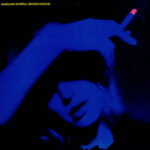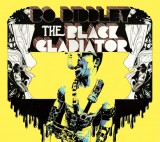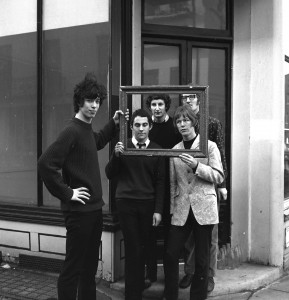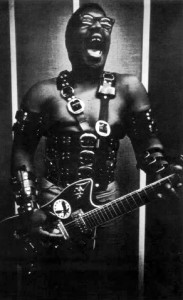-
Featured News
Marianne Faithfull 1946-2025
 By Harvey Kubernik
Singer, songwriter, actress and author Marianne Faithfull passed away on January 30, 2025.
In 2000 I discussed Faithfull with her first record producer Andrew Loog Oldham, the 1
By Harvey Kubernik
Singer, songwriter, actress and author Marianne Faithfull passed away on January 30, 2025.
In 2000 I discussed Faithfull with her first record producer Andrew Loog Oldham, the 1 -
Featured Articles
The Beatles: Their Hollywood and Los Angeles Connection
 By Harvey Kubernik
JUST RELEASED are two new installments of the Beatles’ recorded history, revised editions of two compilation albums often seen as the definitive introduction to their work.
Or
By Harvey Kubernik
JUST RELEASED are two new installments of the Beatles’ recorded history, revised editions of two compilation albums often seen as the definitive introduction to their work.
Or -
Pete Cosey 1943-2012
By Eric Colin Reidelberger
Few guitarists are more underappreciated than the big man, Pete Cosey. An incomparable aural trailblazer and avid woodshedder who blew the doors off every entrance he made. As a wide-open player who employed many musical “systems” (as he called them) he preferred bridges to barriers and played with jazz, country, frat rock and blues bands alike, when that practice was purely unheard. He was a session man, manipulator of chord progressions and such a wild experimentalist that Miles Davis once told him that he “…wrote differently than anyone he’d heard.” It’s with hope that there are more extant sides to arrive from this mountain of a man, both physically and as an institution. Below Sir Eric Colin gives lip service to the man’s history and prowess, plus I’ve included a playlist of some of Cosey’s contributions. What’s your fave-rave? (jeremy nobody, esq.)
Pete Cosey’s name might not have been at the tip of everyone’s tongue, but if you owned any records on the Chess label from the late ’60s or dug your heels into any of Miles Davis’ grand wigouts, then chances are you are probably familiar with his handiwork. A sonic adventurer that boldly went where only a few dare tread, finding the continuity between Jazz, Funk and Psychedelic Rock and trailblazing his own pathway to the nether regions.
Born in Chicago, Illinois, in 1943 and after living his teenage years in Phoenix, Arizona, Pete cut his teeth as a session player in the ’60s/early ’70s back in Chicago for Chess Records. He played on numerous sessions (often uncredited) by artists such as Etta James, Chuck Berry, Gene Ammons, Sonny Stitt, Rotary Connection and the polarized electric periods of both Howlin’ Wolf and Muddy Waters. Adding a surfeit of effects, including a wonderful preponderance of wah-wah/fuzz acrobatics, Pete managed to completely horrify blues purists in one fell swoop, and gather quite an audience of heads who would go on to champion his bold explorations in the years to come.
Cosey was a truly inventive and original player who was obviously influenced by Hendrix’s stylings, but taking the proceedings into an almost unhinged free jazz territory akin to similar giant steps taken by fellow traveler Sonny Sharrock. He was an embryonic member of Chicago Afro Funk behemoths The Pharoahs who later became the seeds of Earth, Wind & Fire, as well as exploring some spiritual journeys with Philip Cohran. Pete is best remembered for the four albums he played on under Miles Davis’ solid-band leading hand: Get Up With It, Pangea, Agharta and Dark Magus.
It is here and in such stellar company that his creative being was given the proper chance to flourish; often pushing the music (and perhaps) the musicians into fever pitch territory.
After the breakup of the Miles band in 1975, Pete kept a relatively low profile, only rearing his head here and there in the years afterwards, most notably playing on the title track to Herbie Hancock’s Future Shock. On May 30, 2012 in Chicago, after complications with surgery, the world lost yet another major musical talent who really wasn’t given the proper credit of the true sonic pioneer he was.
From our current issue, Ugly Things #33, jeremy nobody, esq. reviews one of the grand experiments Cosey contributed to: This Is Howlin’ Wolf’s New Album: https://ugly-things.com/reviews/albums/
Bo Diddley – The Black Gladiator

(Future Days) CD
Recorded and released in 1970, The Black Gladiator was Bo Diddley’s first album of all new material since 1965’s 500% More Man. In the intervening half-decade the music scene had been through some pretty radical changes, and the astute and forward-thinking Diddley wasn’t about to be left behind. “I just decided to do somethin’ different,” he told biographer George R White. “Everybody was wearin’ funny lookin’ crap—Isaac Hayes had come out with chains an’ stuff on, an’ it was kinda flowin’ in that area at that particular time—so I got me some belts an’ stuff, an’ said I was The Black Gladiator.”
The resultant album is one of the overlooked gems in the Diddley catalog, showcasing a freakier, funkier sound that was in step with the times, while retaining the raunch and swagger that defined his earlier work. Bo goes balls-out on the very first track, “Elephant Man,” whipping up a torrid, wall-shaking guitar riff over which he hollers some of his craziest rhymes yet, about how he constructed this bizarre animal, called the elephant (maybe you’ve heard of it?), piece by piece, naming its various body parts, then letting out a blood-curdling scream every time he gets around to not quite mentioning its ass. Such profundity was in short supply at the time.
The album never quite scales the elephantine heights of its monster opening number, but there’s still much to enjoy. The backing band cooks throughout—plenty of wailing organ, rattling tambourines and crisp, funky drumming—and Bo is clearly having a ball with this new, different sound. “Black Soul,” “I’ve Got a Feeling” and “Funky Fly” all boast tough, memorable grooves as well as plenty of muscular guitar work. “You, Bo Diddley” is one of Bo’s archetypal self-tributes, as is “Power House,” a virile boast built around his trusty “I’m a Man” riff, while the strange but wonderful “I Don’t Like You” is one of Bo’s trademark signifying pieces in the tradition of “Say Man,” with Bo trading insults with backing singer Cornelia Redmond (a.k.a. Cookie Vee) and also showing off his abilities as an opera singer—was there no end to this man’s talents?
There’s been a vinyl boot doing the rounds, but this digipak CD with liners by Scott Schindler is a legit, from the masters, reissue on Light in the Attic’s new Future Days imprint. (MS)
(Originally published in Ugly Things #33, Spring/Summer 2012)
The Attack: An Interview with Richard Shirman
By Mike Stax
Inhabiting a region of the sonic solar system somewhere between the Creation and the Small Faces, the Attack languished in comparative obscurity back in their day, only to be recognized decades later as one of the most exciting bands of the era.
That none of the band’s four singles for Decca cracked the charts was more down to bad luck and record company incompetence than any shortcomings on the band’s part. Their first effort, in January 1967, was a sharp version of the Ohio Express/Standells nugget “Try It,” backed with the great, Hammond-drenched mover “We Don’t Know.” Composed by singer Richard Shirman and lead guitarist Davy O’List, the song was nominally based on an obscure soul single, Mona Lisa’s “They Don’t Know,” with new, sarcastic social comment lyrics, including the opening salvo: “We don’t know about the H-Bomb / We don’t know about drugs / We don’t know what is going on / They say that we are thugs.”

The Attack, 1967. L to R: Richard Shirman, Barney Barnfield, Davy O’List, Gerry Henderson, Bob Hodges (glasses). (Photo courtesy Phil Smee)
While “Try It” failed to click with the record buying public, the band felt they were onto a sure thing with their next release, “Hi Ho Silver Lining,” but they were beaten to the bunch by Jeff Beck who romped into the charts with his Mickie Most-produced version after the Attack’s record was delayed at the pressing plant. The B-side was a cracker too. Based on a blistering guitar hook by O’List, “Any More Than I Do” was the Attack at their most incendiary, and still thrills every time. Totally disillusioned by the failure of “Hi Ho Silver Lining,” this lineup folded shortly afterwards, with O’List going on to the Nice.
